18 years ago today, at the final match of Arsenal’s home stadium of Highbury, their star forward Thierry Henry scored a hattrick against Wigan Athletic in what was a game they needed to win to secure Champions League qualification. At one point being 2-1 down, the club captain and all-time leading goalscorer Henry scored three goals in succession, concluding the moment by kneeling down to kiss the turf on what had come to be known as the “Home of Football” in London. READ more about the end of the famous stadium… (2006)
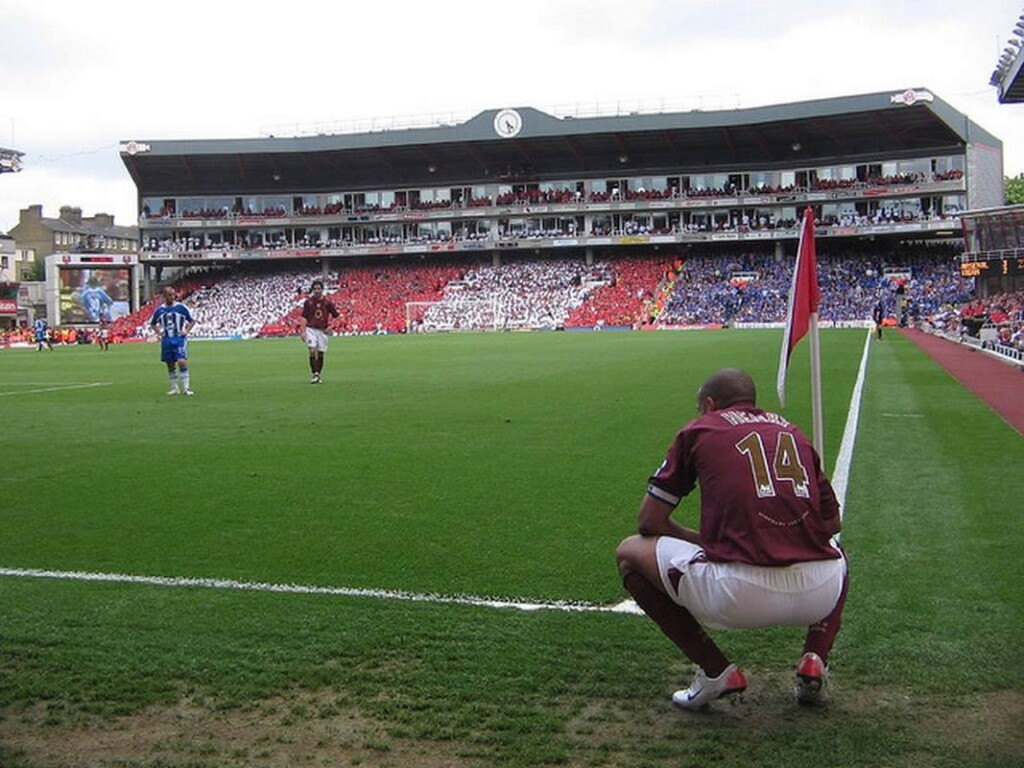
Legendary Arsenal manager Arsene Wenger, who oversaw the win against Wigan, said years later that they left part of their soul at Highbury after moving to the brand-new Emirates Stadium.
Many parts of the stadium were auctioned off for charity, while the Art Deco architecture of the east and west exterior stands were preserved and incorporated into a housing development called Highbury Square. The pitch on which 80 years of memories were made became a communal garden, while the large clock which sat inside the stadium was also preserved and installed in the new stadium.
MORE Good News on this Day:
- Beethoven’s 9th Symphony (the Chorale), one of his greatest masterpieces, composed while he was completely deaf, premiered in Vienna [more below*] (1824)
- The American Medical Association (AMA) was founded in Philadelphia, Pennsylvania (1847)
- General Alfred Jodl, assistant to Hitler’s successor, signed Germany’s unconditional surrender at Reims, France, ending the Nazi aggression in World War II (1945)
- The concept of the integrated circuit, the basis for all modern computers, was first published by Geoffrey W.A. Dummer (1952)
- Pope John Paul II traveled to Romania becoming the first pope to visit a predominantly Eastern Orthodox country since the Great Schism in 1054 (1999)
38 years ago today, the Canadian Patrick Morrow became the first man in history to climb all of the True Seven Summits when he completed the climb up Puncak Jaya on the Island of New Guinea—the tallest mountain in Oceania. Born in 1952 in BC, his abilities as an adventure photographer led to him being selected for the Canadian Everest Expedition in 1982. On Mount Everest, he realized he had stood atop 3 continents – North America, South America, and Asia—and during the next 4 years, he climbed to the highest points of Europe, Africa, Antarctica, and Australasia.
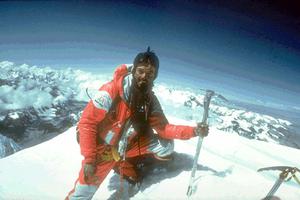
American businessman Dick Bass claimed mountaineering’s “grand slam” before Morrow, but while Bass used Australia’s Mount Kosciusko as one of his 7 targets, Morrow included all of Australasia in his continental definition, and thus he climbed Carstensz Pyramid in Irian Jaya, a peak nearly twice as high as Kosciusko. (1986)
On this day 5 years ago, the city of Denver, seeking to acquiesce to people’s inalienable right to choose what to put in their bodies, decriminalized the possession of psilocybin mushrooms. While still not entirely legalized, they are nevertheless much easier to acquire and hold for therapists and others licensed to use mushrooms in their life-saving therapies, while the first six months following the enactment of the law saw no arrests for psilocybin-related substances.

A year before the news from Denver, the FDA had placed psilocybin as a breakthrough therapy designation following years of research at Johns Hopkins University, after which Boulder, D.C., and Oakland California all began passing similar restriction easings. Big Cannabis read the tea leaves and found that it was only a matter of time until the legalized cannabis industry became intertwined with that of the mushroom.
Companies like Delic, Mazatec, and Allied, are all using enterprise-level funding and operations to have a supply chain of psilocybin mushrooms in place for when the state of legalization in the country reaches a tipping point.
“Humans have used these mushrooms for thousands of years for healing, rites of passage, spiritual insight, strengthening community, and raising consciousness,” read the Decriminalize Denver website. (2019)
163 years ago today, Rabindranath Tagore, the Indian poet, writer, and uplifting artist who reshaped Bengali culture, was born.
He became the first non-European to win the Nobel Prize for Literature in 1913 as author of the beautiful verse Gitanjali (Song Offerings).
Sometimes referred to as ‘the Bard of Bengal’, Tagore’s spiritual poetry, elegant prose, and magical drawings poked at rigid classical forms and resisted structure. His respect for scientific laws and exploration of biology, physics, and astronomy informed his poetry, which exhibited supreme respect for naturalism.
Currently, both the nations of India and Bangladesh use his songs as their national anthems. CHECK Out some his most famous quotes—and read his final paragraph to the world… (1861)
This dictation from Tagore in 1941 became his last poem, before his death at age 80:
I’m lost in the middle of my birthday. I want my friends, their touch, with the earth’s last love. I will take life’s final offering, I will take the human’s last blessing. Today my sack is empty. I have given completely whatever I had to give. In return if I receive anything—some love, some forgiveness—then I will take it with me when I step on the boat that crosses to the festival of the wordless end.
Famous Quotes:
- “Every person is worthy of an infinite wealth of love – the beauty of his soul knows no limit.” (Glimpses of Bengal)
- “I slept and dreamt that life was joy. I awoke and saw that life was service. I acted and, behold, service was joy.”
- “Faith is the bird that feels the light when the dawn is still dark.”
- “Clouds come floating into my life, no longer to carry rain or usher storm, but to add color to my sunset sky.”
- “A mind all logic is like a knife all blade. It makes the hand bleed that uses it.”
- “Death is not extinguishing the light; it is only putting out the lamp because the dawn has come.”
- “Everything comes to us that belongs to us if we create the capacity to receive it.”
- “Don’t limit a child to your own learning, for he was born in another time.”
- “Age considers; youth ventures.”
- “Trust love even if it brings sorrow. Do not close up your heart.” (The Gardener)
78 years ago today, the innovative electronics company, Tokyo Telecommunications Engineering, co-founded by Akio Morita and Masaru Ibuka, first began operations.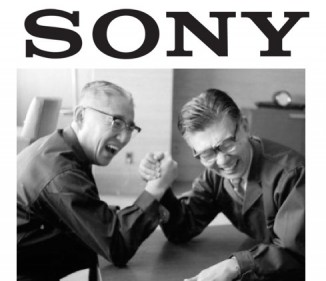
With 20 employees, and later taking the name Sony, they built Japan’s first tape recorder. In 1955, Sony’s transistor radio cracked open the U.S. market, launching the new industry of consumer microelectronics–with teens being the biggest users. Sony’s genius also set the industry-wide standard for professional video cameras and recording with its Betacam format in 1982, which is still in use today, particularly in television news gathering. (1946)
*One of his greatest masterpieces, Beethoven’s 9th Symphony, composed while he was completely deaf, premiered in Vienna. It was the composer’s first on-stage appearance in twelve years; the hall was packed. Beethoven was several measures off and still conducting when the orchestra finished.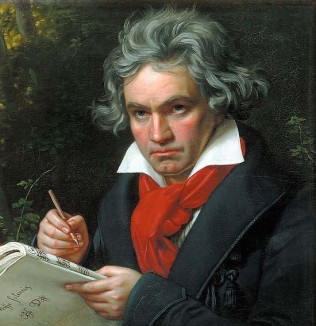
The contralto Caroline Unger walked over and forcibly turned Beethoven around to accept the audience’s cheers and applause. According to one witness, ‘the public listened to his wonderful, gigantic creations with the most absorbed attention and broke out in jubilant applause, often during sections, and repeatedly at the end of them.’ The whole audience acclaimed him through standing ovations five times; there were handkerchiefs in the air, hats, raised hands, so that Beethoven, who could not hear the applause, could at least see the ovation gestures. The theater house had never seen such enthusiasm in applause.”
It includes part of the poem, An die Freude (Ode To Joy) by Friedrich Schiller: Glad, as his suns fly Through the Heavens’ glorious plan, Run, brothers, your race, Joyful, as a hero to victory. Be embraced, you millions! This kiss for the whole world!
In Modern Day Odes to Beethoven’s Ninth, the symphony is used as the official anthem of the European Union; students in Beijing’s Tiananmen Square broadcast the symphony through loudspeakers during their 1989 protest as a statement against tyranny; and a famous performance conducted by Leonard Bernstein on December 25, 1989 celebrated the fall of the Berlin Wall. (1824)
And 305 years ago, and celebrated today, the city of New Orleans was founded by Jean-Baptiste Le Moyne de Bienville of the French Mississippi Company.

It was named for the French city of Orléans, and became a major U.S. port known for its multilingual Creole culture and cuisine—and, of course, for the music. The birthplace of jazz is Bourbon Street in the French Quarter. With its annual Mardi Gras and Jazz festivals, ‘The Big Easy’ has become the most unique city in America. (1718)
Also 105 years ago today, Eva Perón, the First Lady of Argentina beloved by millions as a champion of the poor, was born. Impoverished as a child, “Evita” took charge of the Ministries of Health and Labor after her husband Juan was elected president in 1946.
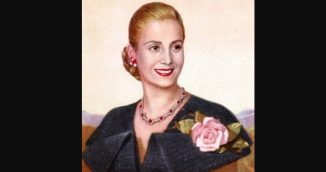 She devoted a huge amount of time to meeting with poor Argentinians, visiting hospitals and orphanages, giving money and medicine (and hugs and kisses) to the poor and sick. Her Eva Perón Foundation distributed 500,000 sewing machines, 400,000 pairs of shoes, and 200,000 cooking pots annually—and handed out toys at Christmas to 4 million children. It also funded the building of hospitals, schools, and housing for homeless women.
She devoted a huge amount of time to meeting with poor Argentinians, visiting hospitals and orphanages, giving money and medicine (and hugs and kisses) to the poor and sick. Her Eva Perón Foundation distributed 500,000 sewing machines, 400,000 pairs of shoes, and 200,000 cooking pots annually—and handed out toys at Christmas to 4 million children. It also funded the building of hospitals, schools, and housing for homeless women.
During her six years in office, Eva Perón also championed women’s suffrage until females did get the right to vote and run for office. Her career and life were cut short by cancer at age 33, but she was honored like a fallen saint by the Congress, and three million weeping people in Buenos Aires attended her state funeral.
Not only has she been featured on national coins and currency, many Argentinians view her as an actual saint, hanging her photo on the wall next to the Virgin Mary. Indeed the Congress before her death gave her the title ‘Spiritual Leader of the Nation’. Cristina Fernández de Kirchner, the first woman elected as President of Argentina (in 2007), claims that women of her generation owed a debt to Eva for ‘her example of passion and combativeness.”
Her fame also transcended continents in the 1970s, when Andrew Lloyd Webber produced the stage musical ‘Evita’, and worldwide fascination was revived again in 1996 with the musical film starring Madonna. (1919)
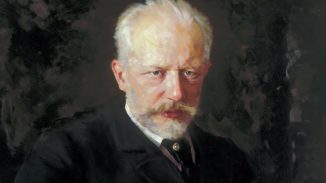
And, 183 years ago today, Peter Ilyich Tchaikovsky, the iconic Russian composer was born. Famous for his ballets like The Nutcracker, Swan Lake, Romeo and Juliet, and The Sleeping Beauty—he also wrote popular classical works including the famous 1812 Overture (the one with the cannon fire often played on Independence Day).
He became the most popular Russian composer of all time, and the first whose music made a lasting impression internationally, bolstered by his appearances as a guest conductor in Europe and America, until his death at 53 years old. WATCH a short bio to hear a couple of highlights… (1840)
SHARE the Milestones, Memories, and Music…





















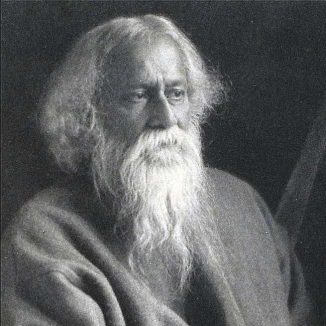
[…] post Good News in History, May 7 appeared first on Good News […]
[…] post Good News in History, May 7 appeared first on Good News […]
[…] post Good News in History, May 7 appeared first on Good News […]